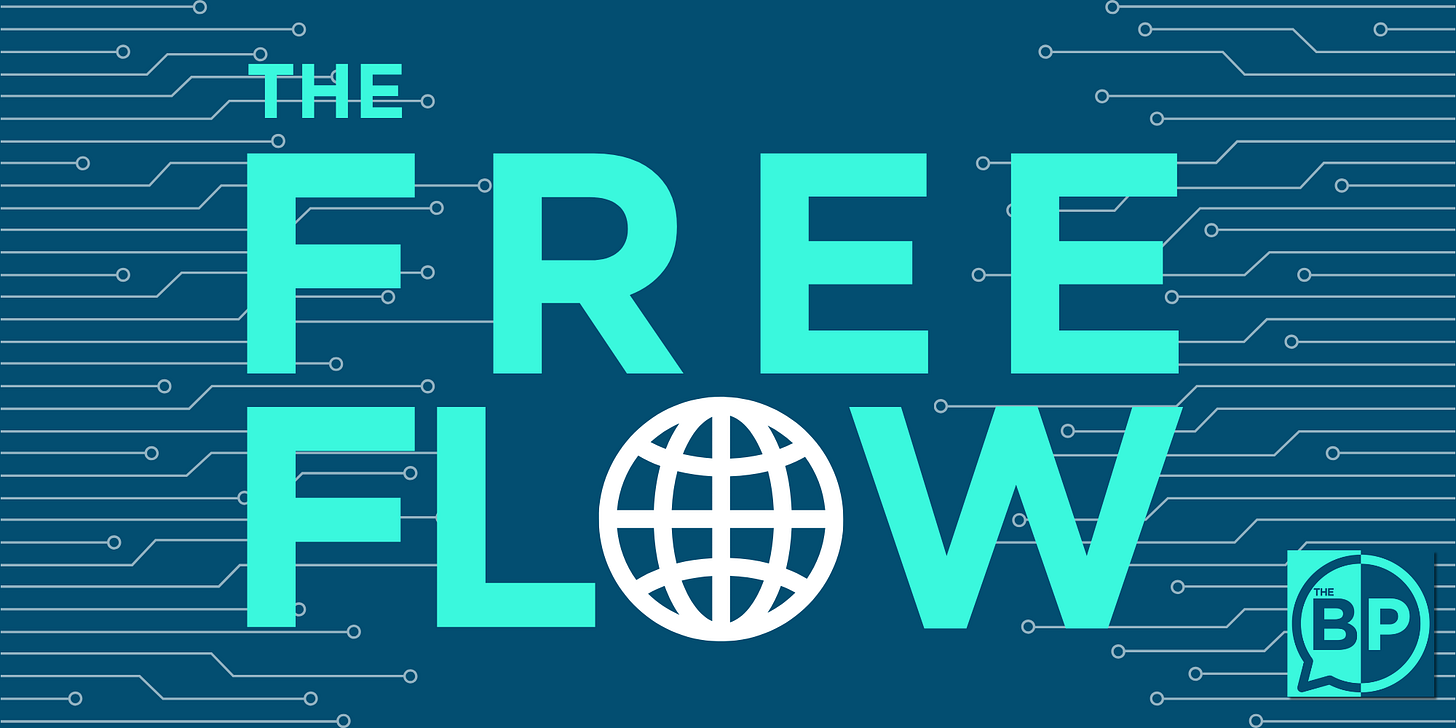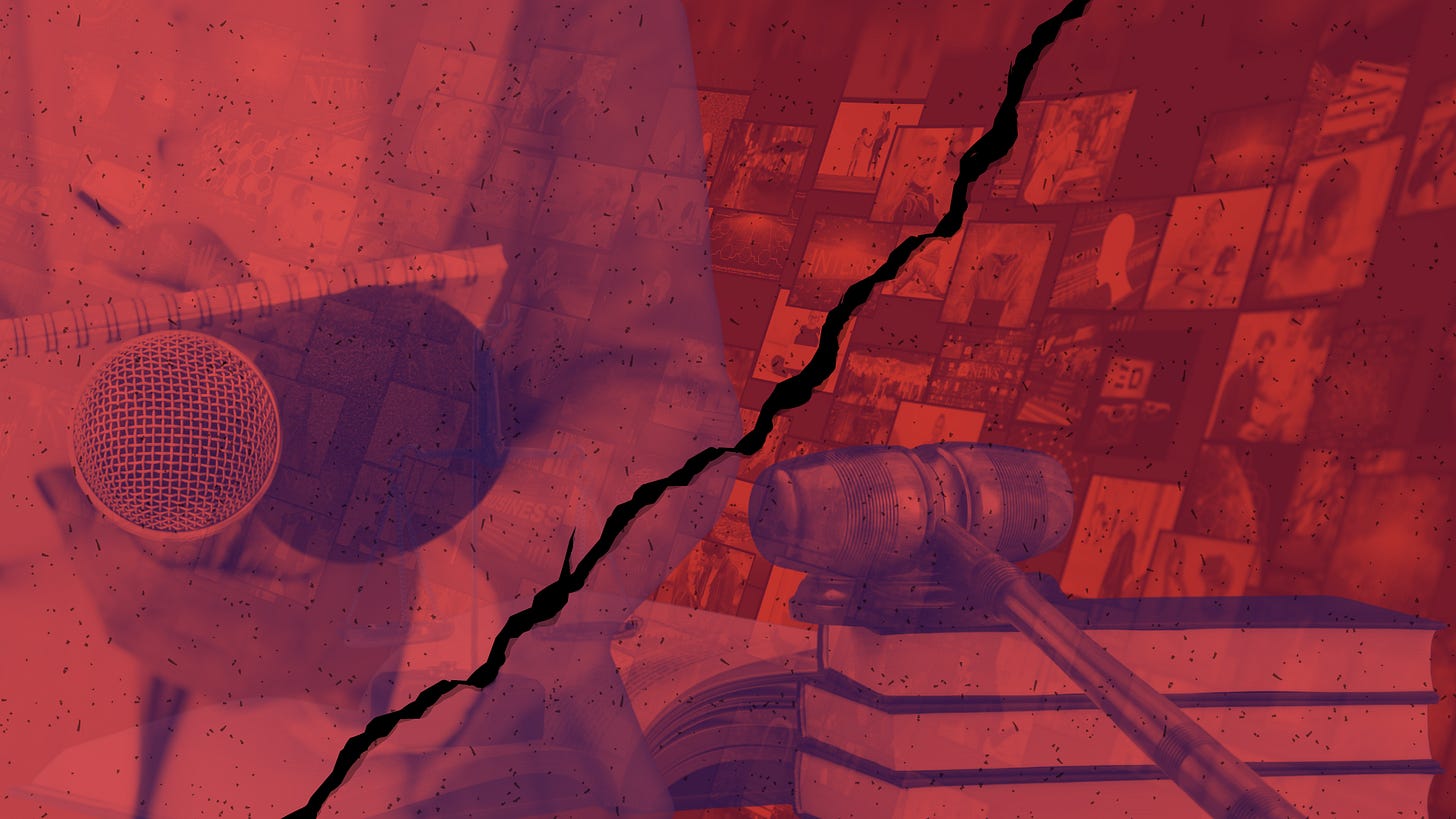Russia Restricts Messaging Apps & Dutch Terrorism Bill Raises Alarm | The Free Flow 8/21/25
Russia restricts WhatsApp and Telegram, YouTube tests AI age checks in the U.S., Dutch ‘terrorism glorification’ bill sparks alarm, India enforces sedition law, and more!
This Week At A Glance 🔎
— 🇷🇺 Russia Restricts Encrypted Messaging Apps
— 🇺🇲 YouTube Testing AI Age Verification System in the U.S.
— 🇳🇱 Dutch ‘Glorification of Terrorism’ Bill Sparks Free Speech Concerns
— 🇮🇳 India’s New Sedition Law Targets The Wire
— 🇰🇬 Kyrgyzstan Passes Restrictive Mass Media Law
First of All 🇺🇲
» U.S. to Screen Immigrants for ‘Anti-Americanism’
U.S. Citizenship and Immigration Services (USCIS) will now consider “anti-American,” antisemitic, or terrorist-supporting views when deciding on immigration benefits such as green cards.
Background:
USCIS stated that immigration benefits are a “privilege, not a right,” and should not extend to those who “despise the country and promote anti-American ideologies.”
The policy does not define what constitutes “anti-Americanism,” leaving broad discretion to immigration officers.
Critics warn that this vagueness opens the door to subjective judgments, bias, and stereotyping.
Civil liberties groups fear it could penalize lawful immigrants for their political opinions or social media activity, chilling speech among immigrant communities.
Our Take: Jacob Mchangama and Hirad Mirami argue that silencing foreigners will not make American safer and that we should welcome, not punish, dissenting outsiders who express unpopular opinions.
» Federal Judge Restricts FTC Investigation of Media Matters, Citing First Amendment
A federal judge issued a preliminary injunction against the Federal Trade Commission’s (FTC) investigation into Media Matters, ruling that the agency’s probe likely violated the First Amendment.
Background: The case stems from the group’s 2023 reporting on antisemitic posts appearing alongside ads on X, which led major brands to pull advertising. and triggered backlash from Elon Musk and Trump administration officials.
The Ruling:
U.S. District Judge Sparkle L. Sooknanan held that the FTC’s civil investigative demand—seeking Media Matters’ contacts with advertiser coalitions—appeared retaliatory.
She wrote, “It should alarm all Americans when the Government retaliates against individuals or organizations for engaging in constitutionally protected public debate.”
Our take: This ruling emphasizes that regulatory tools cannot be used to punish speech critical of those in power. When there is evidence that shows that the government is tied to viewpoint retaliation, the judicial system is right to step in. — Ashkhen Kazaryan
The Digital Age 🤖
» Russia Restricts WhatsApp and Telegram as it Pushes for Internet Control
After accusing WhatsApp and Telegram, popular foreign-owned encrypted messaging platforms, of being used “for sabotage and terrorist activities,” Russia has started restricting calls on the apps.
Details:
The Russian news agency Interfax claimed the tech firms ignored demands to share information with law enforcement authorities.
Human Rights Watch said Russia’s escalating crackdown on the Internet following its invasion of Ukraine has pushed users onto state browsers and media to access interpretations of current and historic events.
» YouTube Testing AI Age Verification System in the U.S.
YouTube is testing a new artificial intelligence system in the U.S. that will verify users’ ages based on the types of videos they have been watching.
Details:
Users must be logged into their accounts for the system to work, and age assessments will ignore the birth date they enter.
If the system identifies a viewer as under 18, YouTube will impose the controls it already uses to prevent minors from watching videos deemed inappropriate.
This includes: reminders to take a break from the screen, privacy warnings, restrictions on video recommendations, and bans on ads tailored to individual tastes.
While people can still watch YouTube without an account, certain content is automatically restricted without proof of age.
» U.S. Supreme Court Rejects Emergency Request to Stop Mississippi Age-Verification Law
Last Thursday, the Supreme Court declined to block a new Mississippi law that requires age verification and parental consent restrictions on social media platforms.
Details:
An emergency order filed by tech trade group NetChoice was rejected because it had not shown the need to block the law at an early stage of the judicial process.
Justice Brett Kavanaugh, in his concurrence, wrote that NetChoice “demonstrated that it is likely to succeed on the merits” when the case concludes.
Other states, including California, Georgia, and Florida, have passed similar laws that are also being challenged.
The law:
Enacted last year, the law requires minors to verify their age and obtain parental consent to access social media sites.
It also requires social media companies to make “reasonable efforts” to ensure minors are not exposed to harmful content.
Our take: The Court’s refusal to intervene right now is a procedural decision, and Justice Kavanaugh’s concurrence is a strong indicator that NetChoice is likely to win on the merits since the Mississippi law burdens minors' and adults' free speech rights to access lawful speech — Ashkhen Kazaryan
» Kyrgyzstan Passes Restrictive Law on Mass Media
Early this month, Kyrgyzstan’s President Sadyr Japarov signed the Law on Mass Media into effect, granting authorities broad control over media outlets and online platforms.
Details:
All media, including online platforms, must register with authorities, and foreign ownership is limited to 35%.
An independent media outlet in the country, Kloop, said that mandatory registration was added to the legislation last minute, overriding an “acceptable compromise” reached between parliament and media experts.
It was passed following recently approved penalties, including fines of up to 65,000 soms (740$) for spreading “false information.”
The Brussels Effect: Europe and Beyond 🇪🇺
» U.S. Human Rights Report Criticizes Censorship in Europe and UK — But Downplays Abuses Elsewhere
The U.S. State Department’s 2024 Report on Human Rights Practices has sparked accusations of political bias, after it called out crackdowns on speech in Europe and the UK but downplayed abuses elsewhere.
Europe and the UK:
The German government rejected the report, which said “the human rights situation in Germany worsened during the year.”
German Deputy Government Spokesman Steffen Meyer responded, “There is no censorship in Germany.”
For the UK, the report identified “limiting speech rights around abortion clinics” as a matter of concern, as well as the Online Safety Act.
Elsewhere:
Criticism of online censorship in Brazil was reflected in the report, unlike the year before.
The report found “no credible reports of significant human rights abuses” in El Salvador, even though it later states that “journalists, media, and civil society organizations . . . criticized the government’s online harassment of critics and rhetoric towards journalists.”
The 2024 report also reversed its prior assessment of Hungary, saying there were “no credible reports of significant human rights abuses.”
However, the report also cites investigations launched by the government against NGO watchdogs and failed to mention how Hungary banned LGBT Pride events.
Our take: The State Department deserves credit for recognizing that free speech concerns are not confined to authoritarian regimes but exist in democracies like Germany and the UK as well. At the same time, the report’s selective omissions—soft-pedaling restrictions in Hungary or El Salvador while highlighting others—undercut its credibility. And while pointing abroad, the U.S. government should also reckon with its own record of targeting the press, critics, and foreigners’ speech at home. If defending free expression is the goal, consistency matters. — Jacob Mchangama
» UK Protestor Arrested Over ‘Plasticine’ Action’ T-Shirt
Brighton engineer, Miles Pickering, was mistakenly arrested for supporting "Palestine Action," a proscribed terrorist group. Instead, he was protesting AI-generated animation at Scotland Yard, wearing a shirt that read "Plasticine Action."
Details:
Pickering was one of 532 arrests made at London’s August 9 Parliament Square protest.
After his arrest, the officer re-approached him and said, “I’m de-arresting you.”
Pickering is now selling the shirts to raise money for a Palestinian aid charity, but police have already advised him that the shirt could still be an arrestable offence in anticipation of a large September 7 protest against the Palestine Action ban.
Our Take: This shows how easily overbroad language in terrorism laws can sweep and chill lawful speech. The UK is going down the path of criminalizing dissent by blurring the lines between national security and speech crackdowns. — Jacob Mchangama
» Dutch Bill Criminalising ‘Glorification of Terrorism’ Sparks Free Speech Concerns
The Dutch government has submitted a draft bill that would criminalize the “glorification of terrorism” and expressions of support for designated terrorist organisations.
Civil society groups warn the law is dangerously vague and risks criminalising legitimate political speech.
Background:
The bill cites actions such as waving an Islamic State flag as examples of criminal conduct but provides no clear definition of what constitutes “glorification” or “support.”
There have been nearly 7,000 public responses to the proposed law, with critics arguing that this broad framing creates a chilling effect and leaves space for arbitrary application.
Targeting of Pro-Palestinian Speech:
Human rights organisations fear the law could be used to target peaceful solidarity movements, particularly those supporting Palestinians.
They point to the UK's experience, where anti-terror laws have been used to suppress protest.
Recently, as we reported in last week’s Free Flow, the UK designated the activist network Palestine Action as a terrorist movement, leading to hundreds of arrests of demonstrators.
Last year, a Dutch MP was accused of supporting Hamas for posting a watermelon emoji, a recognised pro-Palestinian symbol.
Our Take: Read Jacob Mchangama’s recent piece on how “apology for terrorism” laws have been abused to silence dissent in France.
» Dutch Regulators Convene Social Media Platforms Ahead of October Elections
The Netherlands’ Authority for Consumers and Markets (ACM) will host a September 15 roundtable with 12 major platforms, including TikTok, Meta, and X, to review disinformation safeguards before the October 29 elections.
Background:
The ACM, which enforces the EU’s Digital Services Act (DSA) in the Netherlands, is tasked with monitoring election integrity under the law.
In July, the regulator sent letters reminding platforms of their obligations, requesting policy contacts, and asking them to complete a questionnaire on measures against systemic risks such as illegal hate speech, foreign interference, and disinformation.
The September meeting, which will also be attended by the European Commission, other regulators, and NGOs, aims to provide a “clear picture” of platforms’ pre-election strategies.
The EU has pushed for similar pre-election roundtables in other member states.
Following Romania’s annulled 2024 presidential election, the European Commission opened a DSA investigation into TikTok and expanded its probe into X before Germany’s February 2025 vote.
» Ukraine Introduces Anti-LBGTQ Hate Speech Bill
As part of its Association Agreement with the European Union, Ukraine has proposed a bill that introduces criminal liability for discrimination, hate crime, and hate speech, with explicit protections for sexual orientation and gender identity.
The Law:
Expands “protected categories” to include sexual orientation, gender identity, health status, national origin, language, place of residence, and more.
Subjects discriminatory actions, even non-violent ones, to fines or corrective labor. Stricter penalties may be applied to repeat offenders, business owners, or government officials.
Amends Article 300 of the Criminal Code so that content promoting bigotry, including print, video, film, and audio, is banned.
Amends Article 161 of the Code so that public officials who commit hate crimes or involve deceit or threats will face criminal liability.
Our take: 50 years ago, the European Community (as the EU was known at the time) was instrumental in adopting the Helsinki Final Act, which called for human rights and free speech in the Soviet Bloc and empowered embattled dissidents. Today, the EU uses its influence to call for the imprisonment of people who fall afoul of vague and nebulous hate speech laws that are likely to do more harm than good to minorities, including the LGBT+ community. — Jacob Mchangama
Free Speech Recession 🌍
» Russia Outlaws Reporters without Borders
Russia has placed Reporters Without Borders (RSF) on a list of “undesirable organizations,” effectively banning the press freedom group from the country.
Details:
The designation criminalizes RSF’s activities inside Russia, putting staff, supporters, and funders at risk of prosecution and imprisonment.
RSF has long criticized Russia’s censorship, harassment of independent reporters, and restrictions on coverage of sensitive issues such as corruption and the war in Ukraine.
The decision follows a decade of tightening laws on “foreign agents” and “undesirable” NGOs, which have previously targeted Amnesty International, Human Rights Watch, and Memorial.
The clampdown has intensified since Russia’s 2022 invasion of Ukraine, with authorities seeking to isolate Russian society from international scrutiny.
RSF pledged to continue supporting Russian journalists despite the ban.
France condemned the move as part of Moscow’s broader repression of dissent, urging Russia to uphold its international obligations on freedom of expression and access to information.
» India’s New ‘Sedition’ Law Targets ‘The Wire’ Outlet
Assam police filed charges under Section 152 of India’s new “sedition” law against The Wire and its founding editor Siddharth Varadarajan, following a complaint by a ruling Bharatiya Janata Party official.
The case stems from a report quoting India’s defense attaché in Indonesia on “Operation Sindoor,” remarks that were widely covered across Indian media.
The Law:
Section 152 criminalizes acts that endanger India’s “sovereignty, unity, and integrity,” and is widely seen as a repackaged sedition law—mirroring the colonial-era Section 124A, which the Supreme Court suspended in 2022 due to widespread misuse against journalists and activists.
On August 12, India’s Supreme Court granted interim relief, protecting The Wire and its editors from “coercive action,” while also agreeing to hear challenges to Section 152’s constitutionality.
Escalation: The same day as the Supreme Court ruling, Assam police filed a second charge under Section 152, this time naming Varadarajan and senior journalist Karan Thapar, without detailing the alleged offense.
Press Freedom Concerns:
» Georgia’s ‘Foreign Agent Law’ Targets First Set of NGOs
Six of the country of Georgia’s civil society organizations claim that they have been formally targeted under the country’s newly enacted “Foreign Agents Registration Act” via inspection notices from the Anti-Corruption Bureau.
The Notices:
Accusations of violating the act were followed by threats of criminal charges and demands for an explanation of their refusal to register as “agents.”
The letter claims organizations could be seeking to influence the government, state bodies, or the public with the aim of shaping policy, and failing to register as an “agent of a foreign principal” could lead to criminal prosecution.
NGO Response:
The affected NGOs insist they only serve Georgia’s national interest and said, “We will not live under Russian laws.”
Ashley Haek is a communications coordinator and research assistant at The Future of Free Speech.
Justin Hayes is the Director of Communications at The Future of Free Speech and the Managing Editor of The Bedrock Principle.
Jacob Mchangama is the Executive Director of The Future of Free Speech and a research professor at Vanderbilt University. He is also a senior fellow at The Foundation for Individual Rights and Expression (FIRE) and the author of Free Speech: A History From Socrates to Social Media.Ashkhen Kazaryan is a Senior Legal Fellow at The Future of Free Speech, where she leads initiatives to protect free expression and shape policies that uphold the First Amendment in the digital age.








